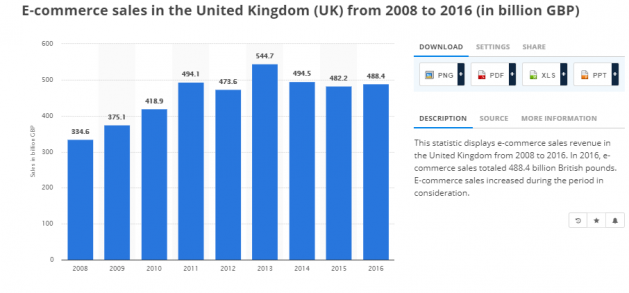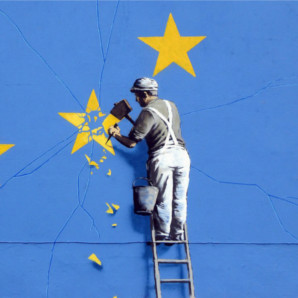What Impact Could A No Deal Brexit Have On The UK Ecommerce Industry?
Brexit has been the UK’s defining topic since 24 June 2016. Whatever your Brexit stance, the conversation around the deal the UK will get from the EU has shifted substantially in the last two years.
From Liam Fox’s claim that a deal would be "the easiest in human history," the UK now finds itself facing down the 27 chambered barrel of a potential no deal Brexit. How will it affect the UK’s ecommerce industry? We’ll see.
Recommended reading: What does the Brexit mean for ecommerce?
Why are we talking about a no deal Brexit?
Much has been written about the UK government’s approach to Brexit negotiations. However, it was the UK government’s own words which crystallised the possibility of a no deal Brexit.
The UK government published 25 papers on 23/08/2018, How to prepare if the UK leaves the EU with no deal. This collection outlines the UK government's guidance for businesses in the event of a no deal Brexit.
Since then the prospect of a no deal Brexit has increased, with EU leaders rubbishing the UK government’s Chequers proposal for a deal based on a common rulebook. The UK Prime Minister, Theresa May, has insisted that if the Chequers proposal is unsuccessful then there will be a no deal Brexit.
Why is this so important?
The EU is the biggest trading partner for many of the UK’s retailers, especially online retailers. Take Asos. 64% of the ecommerce brand’s sales are from overseas sales. EU nations make up of those sales, making the EU responsible for £257.4m for Asos’ annual revenue.
The UK has the third largest ecommerce market on the planet – behind only China and the United States. The UK government’s own figures value the UK ecommerce market at nearly £500 billion:
 That’s not all, though:
That’s not all, though:
- 48% of people in the UK buy their groceries online
- 11% of UK residents purchase all their food using ecommerce
The UK needs ecommerce, and any negative impact on the industry could have real consequences for the UK economy.
No deal, no working supply chain
One of the central planks of Brexit supporters is that it will put jobs back into the hands of British citizens. However, the risk for UK ecommerce companies is that a no deal Brexit will undermine a supply chain which is based on tight schedules.
Ecommerce companies based in Northern Ireland and trading with the Republic of Ireland will have serious issues with their supply chain. Currently companies can trade freely and without checks. Under a no deal Brexit there would be checks for every movement of goods between the two countries.
‘72% of UK consumers shop more if same-day delivery is possible.’ However, under a no deal Brexit, the extra time added by checks at borders could make this impossible. This could cause customers to turn away from online retailers and buy their goods in-store, where they know they can get them on the same day.
TechUK deputy CEO Antony Walker explains how damaging this could be to the ecommerce industry: “No Deal means a full third-country customs regime with the EU. That would create significant and unpredictable disruption to supply chains, new costs for UK tech businesses exporting to the EU and long delays for those trying to get goods into the UK, including the millions of packages sent via just-in-time e-commerce services.”
Should I get out of the ecommerce industry?
The problem with a no deal Brexit is the we can only predict how serious the consequences will be. While changes to the supply chain are a given, we can’t say exactly how much time border checks will add.
Ecommerce is an industry that is built on both frictionless trade and ultimate shopping convenience. This has turned Amazon into a near trillion dollar business. But it’s also made it possible for anyone to set up a company and make it into an asset worth millions.
Right now, ecommerce in the UK is at its peak and your company is likely to be at the height of its power. But if you’re really worried about the future — it may be worth exploring your options for a successful exit. Why not start looking at ecommerce businesses for sale in your niche, to see what your company could be worth if you sold it on.
Or, you may want to ride it out and focus on growing your business in other ways. Social media and multichannel marketing — these show no sign of slowing down. Futureproof your business by investing in long-term brand building and marketing, and try to create evergreen product and service offerings. Things to consider:
- The popularity of the subscription model makes it a good way to sell products right now
- Personalised and bespoke wins over generic products — try to make what you offer as unique as possible
- Influencer marketing, co-marketing, and partnerships can help give your ecommerce brand a permanent boost.
Brexit is the UK’s most significant economic policy change since it joined the European Union in 1973. A no deal Brexit doesn’t leave the UK ecommerce industry unable to trade, but it does render it unable to trade as quickly. What will the impact of this be? We’ll have to wait and see...
 Patrick Foster is a writer and ecommerce expert from Ecommerce Tips — a leading ecommerce blog filled with useful articles from the industry. Big on politics and economics, Patrick is always keen to write about the important industry issues of the day! Check out the latest news on Twitter @myecommercetips.
Patrick Foster is a writer and ecommerce expert from Ecommerce Tips — a leading ecommerce blog filled with useful articles from the industry. Big on politics and economics, Patrick is always keen to write about the important industry issues of the day! Check out the latest news on Twitter @myecommercetips.



















